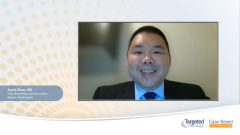
The Future of Upper Gastric Cancer Treatment
David Zhen, MD, provides advice to oncologists treating patients with upper gastric cancer and offers closing thoughts on the future treatment landscape, highlighting challenges and unmet needs.
Episodes in this series

Case: A 60-Year-Old Man with Stage IV Gastric Adenocarcinoma
Clinical Presentation:
- A 60-year-old man with abrupt 10-pound weight loss, dyspepsia, bloating after meals, and loss of appetite, and all symptoms worsening over the past three months.
- PMH and FHx: Overweight and HTN. Patients father deceased at age 50 due to gastric cancer.
Initial Clinical Workup and Diagnosis:
- EGD showed 2 cm protruding mass in the body of the stomach
- No Ulcerations
- Biopsy showed poorly differentiated adenocarcinoma
- Stage IV adenocarcinoma
- Molecular Testing: HER2/neu –; MMRp/MSS, PD-L1 CPS 5%
- CT of abdomen and chest reveal a gastric polypoid mass and thickening; No ascites; 2 lesions in the left lower lobe.
- Lung Biopsy: metastatic adenocarcinoma consistent with gastric primary
- PET/CT confirmed metastatic disease
Current Treatments:
- Patient was initiated on FOLFOX +nivolumab
This is a video synopsis/summary of a Case-Based Peer Perspectives series featuring David Zhen, MD.
Despite the promising progress in extending survival beyond a year with the addition of checkpoint inhibitors to chemotherapy in gastric cancer, the benefit remains modest.
Preclinical data suggest that combining VEGF inhibitors with immunotherapy can promote an immunostimulatory environment. The INTEGRATE II study is investigating the combination of regorafenib and nivolumab in patients who have progressed on prior immunotherapy.
Improving cure rates for localized disease is another challenge, with ongoing studies moving immunotherapy into earlier-stage settings.
Zhen emphasizes the importance of molecular testing for all patients with gastric cancer. In addition to HER2 and PD-L1 status, microsatellite instability (MSI) status should be determined. In CheckMate649, MSI-high patients treated with chemo-immunotherapy had a 4-year overall survival compared with 14 months in non–MSI-high patients. As new targets like Claudin-18.2 emerge, comprehensive molecular testing will be critical for guiding treatment decisions in the first-line setting.
Video synopsis is AI-generated and reviewed by Targeted Oncology™ editorial staff.












































